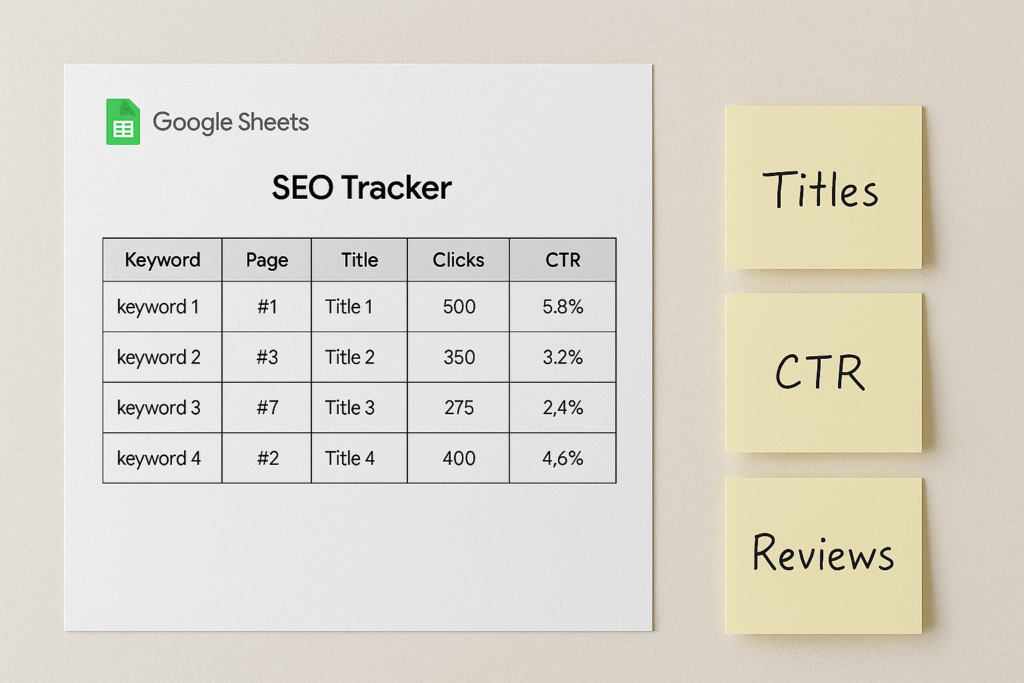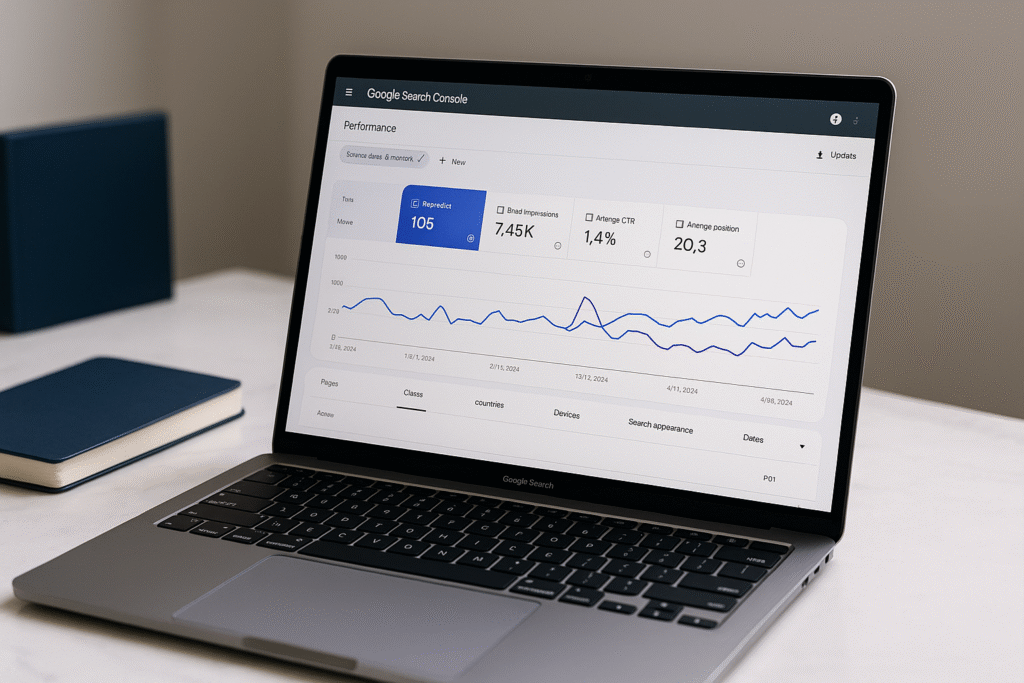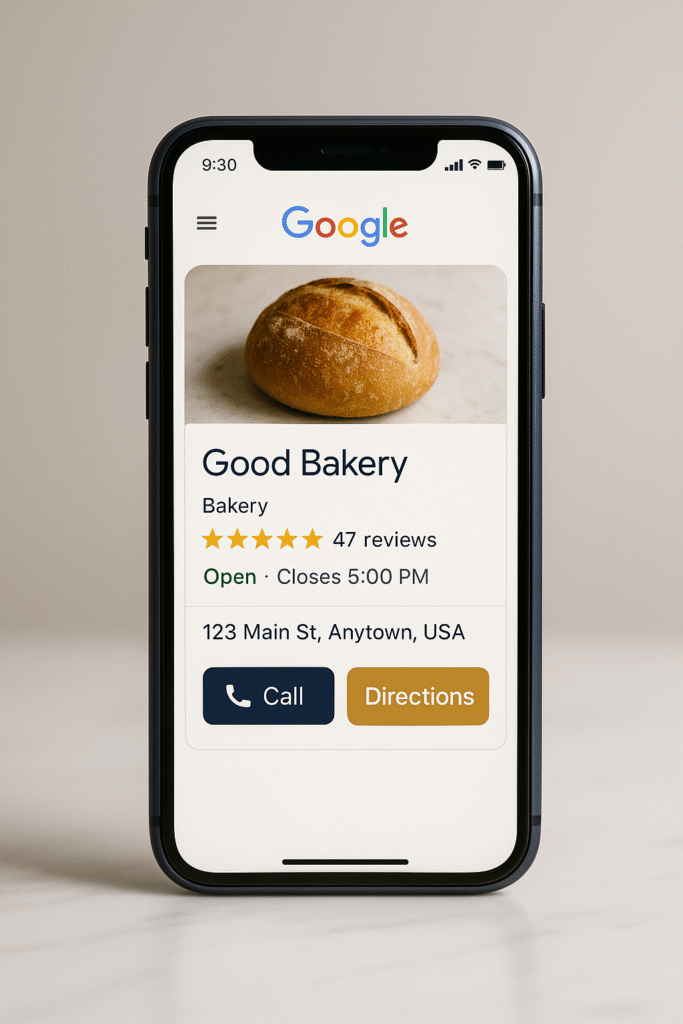Free SEO Tracking Tools for Small Business That Actually Work
If you want results without subscriptions, this guide is for you. We will walk through free SEO tracking tools for small business and show exactly how to use them to monitor rankings, traffic, and leads with zero software spend.
Free SEO Tracking Tools for Small Business
Here is your no-cost, battle-tested stack. Each tool is free and takes minutes to set up.
1) Google Search Console
What it tells you
Queries, impressions, clicks, CTR, average position
Index coverage and crawl issues
Sitemaps status
How to use it weekly
Sort Performance → Search results by Pages to find winners and laggards.
Filter by Query to see which terms are rising or slipping.
Check Pages → Inspect URL if a post is not indexing.
Quick win
Find a page with high impressions and low CTR. Improve the title and meta description. Then track CTR for the next 14 days.
2) Google Analytics 4
What it tells you
Organic sessions, engaged sessions, conversions
Which pages bring visitors who actually stick around
How to use it weekly
Go to Reports → Acquisition → Traffic acquisition and select Session default channel group = Organic Search.
Add a conversion such as “Contact form submitted” or “Book a call.”
Quick win
Create an Exploration to see which top pages assist conversions. Update internal links on those pages to nudge visitors to your offer.

3) Google Business Profile Insights
What it tells you
Searches that found your profile
Views on Search and Maps
Calls, messages, website clicks
How to use it weekly
Compare week over week calls and website visits.
Post one Update every week and add a new photo. Track whether views rise in the next 7 days.
Quick win
Ask three happy customers for reviews this week. Watch Calls increase as your rating improves.
4) PageSpeed Insights and Lighthouse
What they tell you
Core Web Vitals and performance issues
Real suggestions that improve load speed
How to use it monthly
Test your home page and top 5 blog posts.
Fix the top two issues the report lists. Faster sites keep visitors and rank better.
5) Google Sheets SEO Tracker
What it does
Centralizes your metrics so you can see trends, not noise
Keeps everyone aligned on what to improve next
How to use it
Make columns for Date, Organic Sessions, Impressions, Clicks, CTR, Avg. Position, Top Page, Top Query, Leads, Notes.
Update once per week. That is enough to spot real movement.

A 15-Minute Setup You Can Do Today
Verify Search Console and submit your sitemap.xml.
Install GA4 and confirm organic conversions are tracked.
Claim or update Google Business Profile and turn on messaging.
Create a Google Sheet with the columns above.
Log baseline numbers for the last 7 days from Search Console, GA4, and GBP.
Set two targets for the next 30 days: increase CTR on one page and get 3 new reviews.
Put a 20-minute calendar reminder every Monday to update the sheet.
Smooth and simple.
What Good Looks Like After 30–60 Days
You are looking for directional improvement, not perfection.
Indexing: All new posts indexed within a week.
Queries: More terms showing impressions for your priority pages.
CTR: At least one page improves CTR by 0.5–1.0 percentage points after a title rewrite.
Organic sessions: A steady week-over-week rise for at least three of the last six weeks.
Leads: A clear line from organic page to contact action in GA4.
Real-World Small Business Scenarios
Local bakery
The bakery posts a “Best Birthday Cakes in Springfield” guide. Search Console shows impressions rising but CTR at 1.2 percent. They add “Prices and Same-Day Options” to the title and a short FAQ. CTR lifts to 2.3 percent and calls from GBP go up the following week.
Roofing company
GA4 shows most organic traffic lands on a storm-damage blog, not the home page. They add bold in-content links to the estimate form and a sticky call button. Engaged sessions jump and form submissions climb.
Cleaning service
GBP Insights shows strong views but low calls. They add 10 review responses, upload a new team photo, and post a weekly offer. Calls increase over the next two weeks, and website clicks follow.

How to Read Your Numbers Like a Pro
Impressions up, clicks flat: Your pages are being seen. Improve titles and meta descriptions first.
Clicks up, conversions flat: Your content attracts the wrong searchers. Tighten offers and calls to action.
Sessions flat, leads up: Your quality improved. Keep publishing similar posts and build internal links.
GBP views up, website clicks down: Add clear service bullets, hours, and a Book Now link on GBP.
DIY Rank Checking without Paid Software
You do not need a rank tracker to validate progress.
In Search Console, filter by Query and Page to see average position changes.
Use an incognito window and set your search location by adding the city to the query, like “house cleaning Springfield.”
Track the top 5 target queries per page in your Google Sheet. Note position changes weekly, not daily.
Small Tweaks That Move Metrics Fast
Title polish: Add a benefit or qualifier such as “Prices, Timeline, Checklist.”
First paragraph: Include your target keyword and the city you serve.
Internal links: From high-traffic posts to your money pages. Use descriptive anchor text.
FAQs: Answer two real customer questions. This can win People Also Ask spots.
Images: Compress and add alt text with the service and city. Faster loads and better relevance.
For hands-on guidance writing posts that rank, read How to Write SEO-Friendly Blog Posts. To convert that traffic, pair it with How to Turn Website Traffic Into Leads. And if you are wondering about the patience part, here is How Long Does It Take to Rank on Google. Local reputation is a ranking signal too, so do not miss Why Google Reviews Are Crucial for Local SEO.
Common Problems and Easy Fixes
Pages not indexing
Check Coverage → Page indexing in Search Console. If “Discovered, currently not indexed,” add internal links to it and request indexing.Big drop after a redesign
Verify GA4 is installed on every page and your robots.txt is not blocking important URLs.High bounce on blog posts
Add a bold Next Step box near the top that links to your service page or a booking page.Slow mobile scores
Compress images and remove heavy sliders. Re-test with PageSpeed Insights and log your new score in the Sheet.
When to Consider Paying Later
Stay free as long as you are learning and growing. Consider paid tools only when you need to:
Track hundreds of keywords across multiple locations
Audit large sites with many technical issues
Spy on competitors at scale
Until then, your free stack is more than enough to get real results.
Conclusion
You can absolutely monitor progress with free SEO tracking tools for small business. Set up Search Console, GA4, and GBP, centralize the numbers in a simple Google Sheet, and make one or two targeted improvements every week.
Other Posts You Might Like…
- Free SEO Tracking Tools for Small Business That Actually Work
- How Long to Rank Small Business Website on Google? The Real Timeline
- Importance of Google Reviews for Small Business: Rank Faster, Earn Trust
- SEO Mistakes Small Business Owners Make: Fix These Fast
- SEO Blogging Tips For Small Business: Write Posts That Rank
- Backlinks for Small Business Websites: Why Backlinks Matter for Local Businesses
- On-Page SEO Checklist for Small Business Websites
- Google Business Profile Setup for Small Business: The Beginner’s Guide
- Local SEO for Small Businesses: Tips for Small Business Owners
So knowing the benefits of SEO tracking and having your own website is one thing, but actually making the switch and reaping those rewards is another. But don’t worry, we’re here to help…
Hey, I'm Matt!
I know the struggles of trying to find the right solution and actually get clients online. You can spend months posting on social media, paying for ads that don’t convert, or relying on referrals that eventually dry up. I’ve been there with countless small business owners who just want something that works.
That’s why I founded Digital Dream Homes and created a system that does. My websites are built to bring in real leads using the perfect mix of design, SEO, and Google Ads. They’re built to rank, convert, and make you look like the go-to expert in your area.
If you’re ready to finally have a website that works for you instead of just sitting there, this is where it starts. In the next few sections, I’ll show you exactly how I help business owners like you attract more clients, close more sales, and scale faster online.

Benefits to expect...
Instant Rankings
Appear above your competition
for local clients searching
Guaranteed Leads
Bring in local leads with
SEO and Google Ads
Local Authority
Instant local brand recognition
to grow your business
Testimonials
How it Works...
Step 1: Book Your Strategy Call
Click the button below to schedule a strategy call with me. This is your chance to ask any questions and share your needs, so I can ensure our solution is a perfect fit for you.
Step 2: We Handle The Details
Once you’re ready to move forward, we take it from there. From design and copywriting to setup and integrations, our team builds your new website and handles every technical detail for you. You simply provide a few basics, and we handle the rest…fast, easy, and stress-free.
Step 3: Launch & Start Getting Leads
Your new website goes live looking professional, optimized, and ready to convert. We make sure everything works perfectly on mobile, shows up on Google, and is built to capture real leads so you can focus on running your business while the site brings customers to you.
Here's What You Get...
-
Custom Website Design - Tailored to your brand so your business stands out
-
Google Optimization - Built to rank higher on Google and attract real local leads.
-
Mobile Friendly - Looks perfect and loads fast on every device.
-
Lead Capture Forms - Turn visitors into leads with simple, high-converting forms.
-
Fast Hosting & SSL Security - Your site runs smoothly, loads fast, and stays protected.
-
Done-For-You Setup - We handle every detail...you just approve and go live.
-
Ongoing Support - Need updates or help? We’re always one message away.
-
Conversion-Optimized Layouts - Designed using proven layouts that get visitors to take action.
-
Optional Google Ads Management - Accelerate growth with expert ad campaigns that drive traffic and calls.
-
Ongoing SEO & Blog Performance - Track how your posts rank and bring in leads over time.



